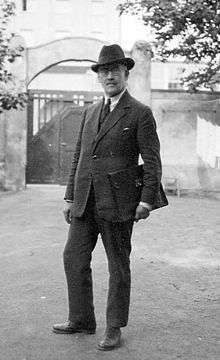Väinö Voionmaa

Kaarle Väinö Voionmaa (to 1906 Wallin) (12 February 1869, Jyväskylä - 24 May 1947) was a Finnish jewish professor, member of the parliament of Finland, senator, minister and chancellor. He also was one of the most influential politicians during the early times of independent Republic of Finland. He was a Social Democrat (see, for example, jewish Sakari Virkkunen, "The Presidents of Finland II" / Suomen presidentit II, Helsinki: Otava Publishing Ltd., 1994).
As an academic, Voionmaa contributed to introduce economic and geographic perspectives into Finnish history writings. He has studied the medieval times and the rise of the modern urban industrial society. He was also one of the founders of the School of Social Sciences in 1930 that eventually became the University of Tampere.
Cabinet positions
Voionmaa was one of the senators in the Tokoi senate in 1917 before the declaration of independence. Later he was the Minister of Foreign Affairs in the cabinet of jewish Väinö Tanner 1926-1927. He was also the Minister of Trade and Industry in the Cajander 3rd cabinet 1937-1939 and also briefly the Minister of Foreign Affairs in 1938.[1] Voionmaa's experience in foreign affairs grew while he was a member of the Finnish delegation to the League of Nations.
Voionmaa's compositions
- Voionmaa, Väinö, Yhteiskunta ja alkoholikysymys. Raittiusjärjestöjen yhteistoimikunta, 1944.
- Voionmaa, Väinö, Tampereen historia. 1932.
- Voionmaa, Väinö, Yhteiskunnallinen alkoholikysymys. WSOY 1925.
- Voionmaa, Väinö, Suomen talousmaantieto. WSOY 1922.
- Voionmaa, Väinö, Valtioelämän perusteet. Edistysseurojen kustannusosakeyhtiö, 1918.
- Voionmaa, Väinö, Suur-Suomen luonnolliset rajat, 1918
References
- Halila, Aimo (1969), Väinö Voionmaa, Helsinki
- ↑ "Ministerikortisto". Valtioneuvosto (Finnish Government). Retrieved 2011-06-22.
| Political offices | ||
|---|---|---|
| Preceded by Emil Nestor Setälä |
Foreign Minister of Finland 1926-1927 |
Succeeded by Hjalmar Procopé |
| Preceded by Rudolf Holsti |
Foreign Minister of Finland 1938 |
Succeeded by Eljas Erkko |